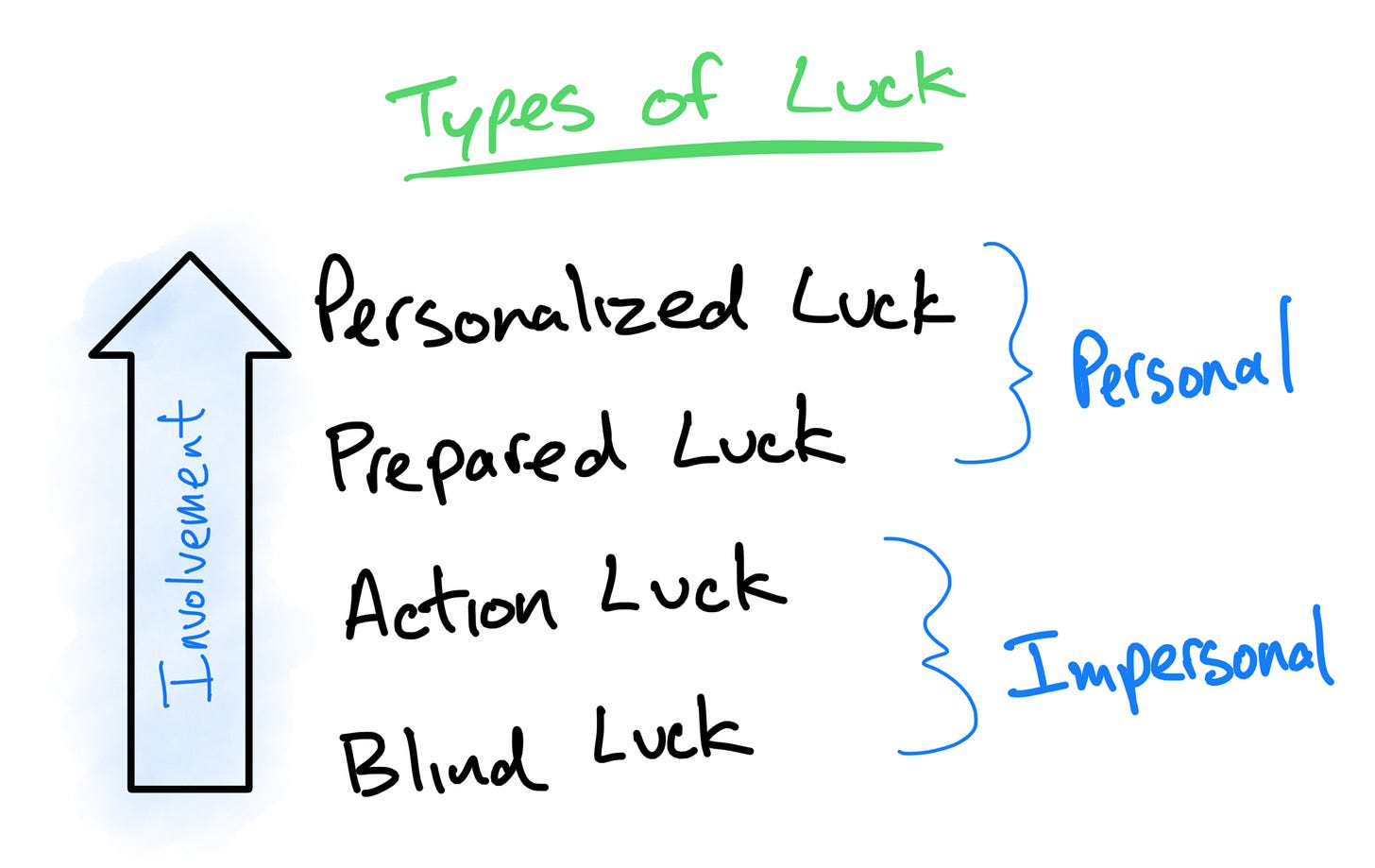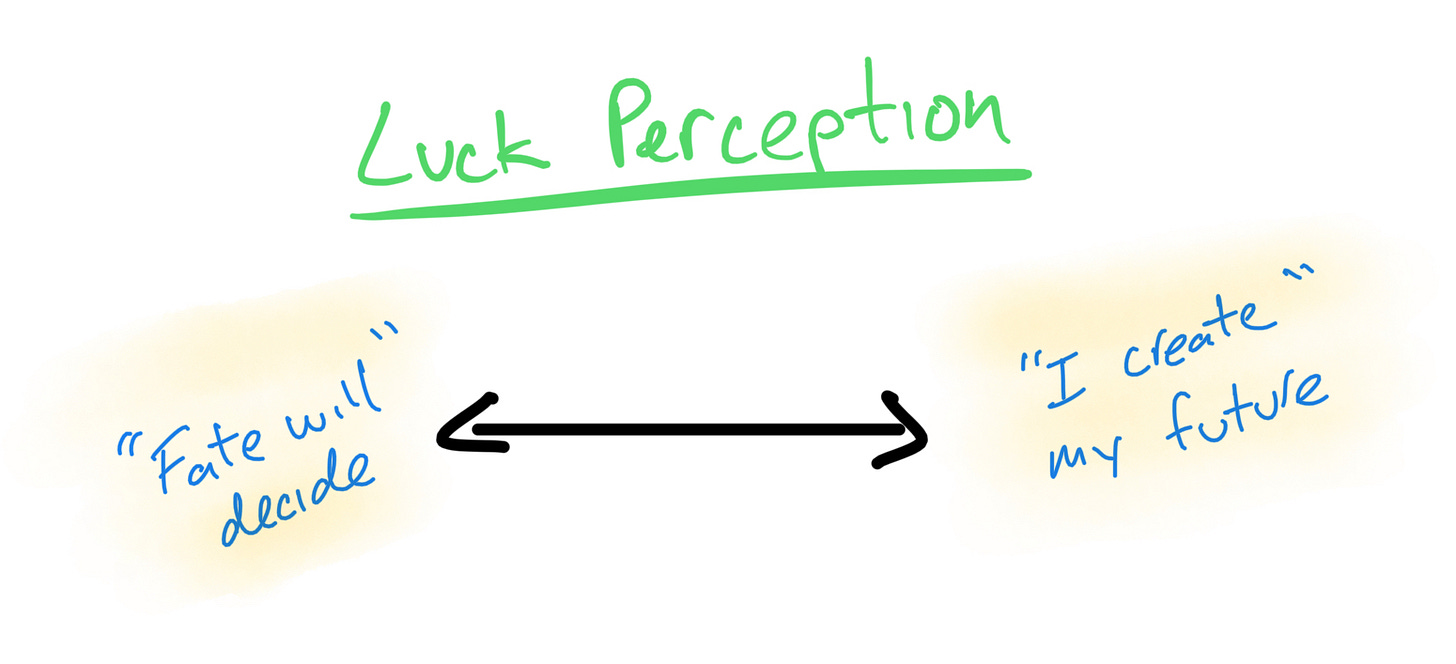Success: Luck and How to Court Good Fortune
Luck exists in various forms. We can influence how much we benefit from it.
I remember the day I swore off luck forever.
I was in middle school and at a track and field meet. I had made it to the 100m qualifying race for city finals. It was the biggest race of my tiny running career. Earlier in the day, I had come across a penny on the ground. It was a sign. I picked up the penny and tucked into my pocket. I knew this lucky penny would grant me success.
At the race start line, I tapped the lucky penny in my pocket. I felt confident and charged.
The gun fired and me and the six other kids took off. I ran with every ounce of energy I had. Crowd cheering, arms flailing, lungs burning, I crossed the finish line.
It wasn’t even close. I was in near last place.
Unhappy and embarrassed, I threw the penny away. My lucky penny failed me. Luck would no longer be something in my life.
But as adults, luck is often credited to success. Either directly as an explanation for one’s success. Or indirectly by onlookers explaining another’s success. We marvel at successful people and wonder, “if only I got a lucky break like that.”
We think of lucky breaks as chance events that lead to success. It could be a fortuitous meeting of someone, a spark of an idea, or an opportunity arising out of the blue. Despite my disbelief in luck, I feel I’ve had a string of lucky breaks in my life. From where I was born, to education and work opportunities, to people I’ve met.
What if there was a way to increase our chance of lucky breaks? And a way that doesn’t rely on a random pieces of metal on the ground.
Let’s take a look.
What’s Good Luck?
Luck is a broad topic. For this post I’ll look at luck as good fortune that happens to us unpredictably and without discernable intention. Good fortune in the context of success towards our goals in life.
Luck events can take several forms. A chance meeting of our future partners on a random morning. A startup business rising out of unexpected industry shifts.
One way to view luck events is in hindsight to look at how much involvement we played in the occurrence and benefit from the event. With involvement level in mind, we can categorize luck events into four groups.1
Blind Luck
Blind luck occurs with no involvement on our side. The event is completely outside of our control. For example, we have no input to the circumstances to which we’re born.
Action Luck - “Fortune Favors the Bold”
Action luck occurs through sheer activity. Activity we do across our lives, whether in work or personal domains. We may not have a specific goal with our activity, but activity invites randomness. Randomness leads to new combinations of ideas and people. “Happy accidents” occur through consistent activity. Companies embrace this principle as they encourage experimentation, a bias for action, and acceptance of failure.
“I have never heard of anyone stumbling on something sitting down.” - Charles Kettering
Prepared Luck - “Chance Favors the Prepared Mind”
Prepared luck arises through an ability to recognize and act on luck events. Unlike blind luck and action luck, which can be experienced by anyone, prepared luck requires uniqueness. Specific skills, knowledge, or experiences create an ability to observe and act on a luck event. Others may not be able to benefit from the luck event, or even notice it altogether.
Personalized Luck - “Character is Destiny”
Personalized luck arises out of our individual personality and behaviors. The luck event comes to us, unsought, because of our distinctiveness as a person. Our skills, character, reputation lead to luck events singularly occurring to us. Perhaps an obscure hobby or profession suddenly becomes needed and opportunities find us. Or perhaps our curious character attracts a future partner.
With Prepared Luck, one is uniquely able to recognize a passive luck event. With Personalized Luck one is uniquely positioned to experience an active luck event. When viewed in retrospect, Personalized Luck borders the idea of fate, where unexpected paths appear “meant to be.”

Getting Lucky - A Guide
If we think of certain types of luck as something we have input on, what can we then do to increase our good fortune?
Good fortune can be broken into two parts: 1) A fortuitous event occurs, 2) We capitalize and benefit from the event.
An increase in either component increases our good fortune. We can increase the chance of an event occurring. We can increase our ability to capitalize on the event.
Here are some ways to we can do both:
Stir the pot
Action leads to outcomes. Yet we often practice inaction more than action. We hinder action through doubt, fear, analysis, or laziness. Rather, court randomness with activity. A bias to meet people, try new things, or probe our interests contributes to the chance of luck events.
Our actions don’t have to be grand. We can take little steps in directions of interest. Little steps keep the investment and negative impact low. Recently, I’ve been hosting an “Ideas Club,” which is like a book club but for talks and podcasts. It’s just something I’ve wanted. But I also invite randomness by stirring the pot through discussions and people met.
"The best way to ensure that lucky things happen is to make sure a lot of things happen" - Bo Peabody, entrepreneur
Go deep
Go deep with chosen interests and domains. Our curiosity and goals are guides for us to go deep. Depth fosters preparedness. Preparedness enables action on luck events.
Depth enables us to uniquely observe and receive luck events. And preparation enables us to act for the most benefit.
Cultivate your uniqueness
Our mix of interests, hobbies, expertise create our uniqueness. Uniqueness in our ability to see and act on the world. Uniqueness in the value we provide to the world.
By embracing and cultivating our uniqueness, we bring forth the individual action that invites Personalized Luck.
Attune to opportunity
Chance events occur constantly. But we don’t recognize them all. Take the moment to notice events as they occur. Our backgrounds enable us to notice events with unique perspective. If we take the moment to notice them.
Vans, the iconic skateboarding footwear brand, had no relation to skateboarding. Nor intention to enter the skateboarding market. Vans was focused on durable affordable shoes. They happened to be based in Southern California. At a time when skateboarding was a budding sport. Through random chance discovery of Vans shoes by skateboarders, Vans recognized the luck opportunity. They leaned into supporting the needs of skateboarders.2 Today, Vans is a $500M/yr business.
"Learn to listen. Opportunity sometimes knocks very softly." - H. Jackson Brown
..And therefore what?
Luck is a tricky concept. Its vague and random nature lead to different interpretations. On one end there’s a belief luck events are completely out of our control. Luck is the realm of otherworldly forces. On another end, there’s a belief luck doesn’t exist and success results completely from our actions. We create luck.

I think a blended perception serves us best. A belief in control over our fates directs our energies towards our goals. A belief in random chance enables humility with our success and resilience with outcomes.
With luck viewed as various types, we see where we can influence our ability to benefit from luck.
Do various stuff. Go deep with interests. Look at the world from our unique lens. The great part is these actions contribute to a rewarding life. These actions lead us to live a life uniquely and authentically us.
How, when, or whether we reap good fortune from our activities and character is unknown.
But to act in a manner that already contributes to a rewarding life, while encouraging good fortune, just adds further anticipation for our journey through life.
No lucky pennies needed.
Ideas adapted from sources:
Austin, J. H. (2003). Chase, Chance, and Creativity: The Lucky Art of Novelty. United Kingdom: MIT Press.
Jorgenson, E. (2021). The Almanack Of Naval Ravikant: A Guide to Wealth and Happiness. India: HarperBusiness.
Maclellan, L., Van Doren, P. (2021). Authentic: A Memoir by the Founder of Vans. United States: Nextone Incorporated.





